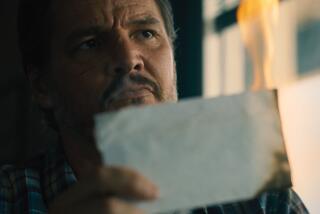Trying to Blaze a Trail
- Share via
With “Punks,” director Patrik-Ian Polk continues in the vein of recently released African American romantic comedies such as “The Brothers” and “Two Can Play That Game,” but with a twist. Reclaiming its title from a derogatory street term for gay men, “Punks” takes an irreverent look at one of America’s hidden communities.
Unlike documentary-style films such as British director Isaac Julien’s “Looking for Langston” (1989) or Marlon Riggs’ “Black Is ... Black Ain’t” (1994), “Punks” presents its narrative on black gay love within a framework potentially more commercial than earlier material on the subject.
Set in West Hollywood, the film revolves around a tight-knit group of black and Latino gay men. Marcus (Seth Gilliam) is a shy fashion photographer in search of a real romance, which he’d love to find with his handsome record-producer neighbor Darby (Rockmond Dunbar).
Darby, however, has a girlfriend (Vanessa Williams), but the two men form a bond that eventually leads them both to drop their defenses. Others in the circle include Hill (Dwight Ewell), the cynical and somewhat jaded elder statesman of the group who is HIV-positive; Chris (Jazzmun), a drag queen; and poor little rich party boy Dante (Renoly Santiago).
The movie follows them as they work, party, dish and date, and in the process we learn a lot about the lives and perspective of this alternately suave and tart-tongued set.
Presenting three-dimensional portraits of the various personalities who populate the minority gay community was a prime goal for the openly gay Polk.
Tired of Seeing
Biased Images
“I was sick of seeing these stereotypical portrayals of black gay men,” he says. “Back [in 1996] when I first wrote the script, there were a lot of gay-themed films opening up, but nearly all of them focused solely on white gay men. When and if a gay man of color was introduced, it was merely for comedic effect or as an oversexed boy toy.
“I wanted to reveal the truth about black gay men while also underlining the ways in which their struggles for love are as funny, dramatic and fascinating as any,” Polk explains over dinner at a restaurant in West Hollywood. “Yes, I intended this movie to be a definitive depiction of the gay black experience. But it’s also about characters going through things that we all go through, whether we’re gay, straight, bisexual, black, white or whatever. Our style and vernacular might be unique and different, but the meaning of our lives is all the same.”
Polk was working at Edmonds Entertainment, which had already broken ground with “Soul Food” and “Hav Plenty” at the time he wrote “Punks.” When he shared the script with Tracy and Kenneth “Babyface” Edmonds, to his surprise, they immediately signed on as producers. “We were impressed with the script’s humor and groundbreaking courage,” Tracy Edmonds says. “It showed us a world that we had never seen before.”
The movie became a company project. “Producer Michael McQuarn let us use his house for key location scenes, and another executive allowed us to use a Ferrari and Rolls-Royce convertible that are featured prominently in the film,” Polk says. “We even used the Hollywood headquarters of Edmonds Entertainment for several locations.”
Finding actors who could deliver the right chemistry for the film was a challenge.
After the roles of Marcus, Hill and Dante were cast, Chris and Darby weren’t as easy. For Chris, “I wanted someone who could accurately portray the world of drag queens--the ones who work so hard and give such amazing performances,” Polk says. “I’ve seen actors playing drag queens in movies, and it never feels real. I didn’t want that. So someone suggested that I see Jazzmun’s live act and I was blown away by it. There was our Chris.”
Casting Presented
Some Challenges
Darby, the straight guy who’s possibly a latent homosexual, posed a different set of problems. “I know a lot of actors who turned down the role because they had concerns about how they would be judged by playing a gay role,” says Rockmond Dunbar, who now plays a happily married father on the Showtime series “Soul Food.”
“For me, Darby presented some fun and wonderful challenges. He’s a guy who lives outside the box. I took the role without question.”
Although “Punks” was first screened at the 2000 Sundance Film Festival, it went without a distributor for nearly two years. “I was shielded” from the process of negotiating with distributors, Polk says. “This is the first American black gay romantic comedy--ever--and Hollywood thought that it was too small to find an audience.”
Finally Urbanworld Films, a New York-based distributor, stepped in to release the film. On Nov. 2, “Punks” began a limited release in key markets such as New York, Atlanta and San Francisco.
With a wider release planned for early 2002, Urbanworld is counting on a snowball. “Hollywood has never released any film like this before,” Urbanworld Chief Executive Stacy Spikes says. “This is a black gay independent movie, so if we can get a chunk of each of those markets, the film will be a success. I feel confident about what’s going to take place with this film, and I believe that it’s going to change the perception of what urban films are about forever.”
More to Read
Only good movies
Get the Indie Focus newsletter, Mark Olsen's weekly guide to the world of cinema.
You may occasionally receive promotional content from the Los Angeles Times.








